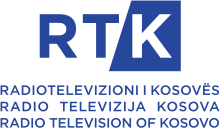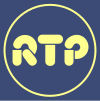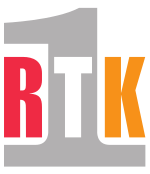Radio Television of Kosovo
 | |
| Type | Radio, television and online |
|---|---|
First air date | September 19, 1999 |
| TV stations | |
| Radio stations | Radio Kosova 1 Radio Kosova 2 |
| Headquarters | Pristina, Kosovo |
Broadcast area | Worldwide |
| Owner | Government of Kosovo |
Key people | Hysen Hundozi (Acting) |
Launch date | 1945 (radio) 1974 (as RTP) 1999 (as RTK) |
Official website | www |
| Replaced | Radio Televizioni i Prishtinës (Radio Televizija Prishtina) |
Radio Television of Kosovo (Albanian: Radiotelevizioni i Kosovës;[a] Serbian: Radio-televizija Kosova; RTK) is the public service broadcaster in Kosovo. It was founded after the Kosovo War, replacing the Radio Television of Pristina. RTK operates two radio services, offering a diverse range of news, music, and entertainment programs. Additionally, it runs four 24-hour television channels, broadcasting a variety of content including news, sports, culture, movies, and documentaries. RTK’s services are available on terrestrial and satellite networks, ensuring wide accessibility across Kosovo and to the diaspora.
As a public service broadcaster, RTK is funded through a combination of public funding, advertising revenue, and donations.
History
[edit]

RTK replaced Radio Televizioni i Prishtinës (The Radio Television of Prishtina, RTP), which was shut down by Serbian forces on July 5, 1990.[1] After UNMIK took over the administration of Kosovo in June 1999 and re-employed former RTP staffs, RTK began broadcasting in September 1999 via analog satellite in PAL and SECAM television broadcast standards with a daily two-hour transmission, expanding to four hours per day in November 2000, with programming mainly in Albanian and once-a-day news edition in Serbian and Turkish. The following July, it expanded to seven hours a day and began offering programming in Bosnian as well.[2]
In 2001, RTK was established as an independent public service broadcaster by a UNMIK broadcasting regulation. The station was initially managed by the European Broadcasting Union to permit time for a non-political Board of Directors to be established. This was in place and the station was independent of the EBU by the end of the year. In January 2002, an office was opened in Tirana, with a website launching in July. A second office was opened in Tetovo in November 2002.
In 2002, at which time it was broadcasting 15 hours a day, 35% of the station's broadcasts were produced externally, with the bulk of programming local. It included news and business coverage as well as farming information. Broadcasting remained multilingual, with programming in another language (the Romani language magazine “Yekhipe") beginning in September 2003. On 22 December of that year, the station began broadcasting 24 hours a day. Also in 2002, RTK began hosting awards, with the best news moderator being honored by the "Drita Germizaj" award and the best cameraman by the "Rudolf Sopi" award.
RTK's radio transmission began with the October 1999 acquisition of the multilingual public radio station "Radio Prishtina", which became "Radio Kosovo". In 2000, it acquired the multi-ethnic UN youth radio station Radio Blue Sky.
In 2013, RTK introduced a new logo and a newly corporate identity for the first time of 14 years since 1999. By that, the grey-coloured 1-numeral along with the red letter R, the white letter T, and the yellow letter K are all replaced by something brand new that is the RTK wordmark which is coloured blue, but it has the letter K being put inside a half square. At the same time, RTK's TV services were expanded to include a channel called RTK 2, which is intended to focus on minorities, and with it, all minority language programming were moved from RTK 1 to RTK 2.[3]
By 2014, RTK saw the launch of two new stations such as RTK 3 which is a news channel and RTK 4 which is an arts and documentary channel. In 2018, the network switched to high-definition broadcasting for all its channels.
Journalists at RTK have repeatedly protested in 2015 against political interference, up to asking for the dismissal of chief editors for obstruction and internal censorship.[4]
Management
[edit]RTK is regulated by the Law on Public Broadcasting. Its financing was originally guaranteed by a license fee paid over electricity bill, until the Constitutional Court declared that it was not due[5] and shifted RTK's budget over state subsidy (0.7% of Kosovo's budget). The change raised concerns for the preservation of RTK's independence. The legal requirement for RTK to plan an end to the transitional state budget funding has not been enacted.[6]: 33 [7]
RTK has been criticised for lack of investigative journalism and political bias, e.g. in the extensive coverage of the ruling political party (including the annual meeting of the ruling Democratic Party of Kosovo) as opposed to the short and misleading coverage of opposition Vetëvendosje 2012 protests, which was deemed "a major signal of state financing putting the editorial independence of public television at risk" (IREX, 2013b).[8]
RTK Board members are elected by the Parliament by majority vote, thus entrusting their appointment to the majority parties. Political pressures aside, RTK maintains an untapped potential thanks to good equipment and professional editors and journalists.[6]: 33
EBU membership
[edit]The RTK has remained in cooperation with the European Broadcasting Union since its inception.[2] However, it is not yet a member and has campaigned for its membership. Such a thing isn't possible given thaat Kosovo isn't a member of the International Telecommunication Union (ITU) or the European Union, both formal requirements for EBU membership. Kosovo's application in the European Council is still underway.[9] One of the main motivations for the RTK to become an EBU member is its potential participation in the Eurovision Song Contest, the campaign for which has also been going since 2014.[10]
In 2023, the RTK began its efforts to embed itself into Eurovision by hosting its own annual song contest, Festivali i Këngës (not to be confused with Albania's contest of the same name).
See also
[edit]Notes
[edit]- ^ Formerly spelled Radio Televizioni i Kosovës.
References
[edit]- ^ "33 vjet nga okupimi i Radio Televizionit të Prishtinës" [33 years since the occupation of the Radio Television of Pristina]. KosovaPress.com (in Albanian). Retrieved 2025-01-02.
- ^ a b "Transmetuesi Publik" (in Albanian). RTK. Retrieved 2023-06-22.
- ^ Sennitt, Andy (2009-03-20). "EBU renews service agreement with RTK Kosovo". medianetwork. Archived from the original on 2009-03-23. Retrieved 2009-08-30.
- ^ "Journalists' solidarity in Kosovo: the RTK case". OBC Transeuropa. Osservatorio Balcani e Caucaso. January 13, 2016. Retrieved 2025-01-02.
- ^ Decision of the Constitutional Court on the temporary measure Case KI 11/09, Tomë Krasniqi vs. RTK et al[permanent dead link]. Complete text of the Decision.
- ^ a b Elda Brogi, Alina Dobreva, and Pier Luigi Parcu, "Freedom of Media in the Western Balkans", Archived 19 August 2015 at the Wayback Machine, study for the European Parliament's Subcommittee on Human Rights, October 2014, EXPO/B/DROI/2013/16
- ^ RTK Financial Sustainability, Archived 22 December 2015 at the Wayback Machine, GAP Policy Brief
- ^ Raporti vjetor i punës për vitin 2012 [Annual work report for the year 2012] (PDF) (in Albanian), Independent Media Commission, 2013, archived from the original (PDF) on March 4, 2016
- ^ "Kosovo erreicht nächste Stufe der Mitgliedschaft im Europarat" (in German). 2023-04-25. Retrieved 2023-06-23.
- ^ "Kosovo drömmer om Eurovision" (in Swedish). Archived from the original on June 24, 2013. Retrieved August 9, 2023.
External links
[edit]
